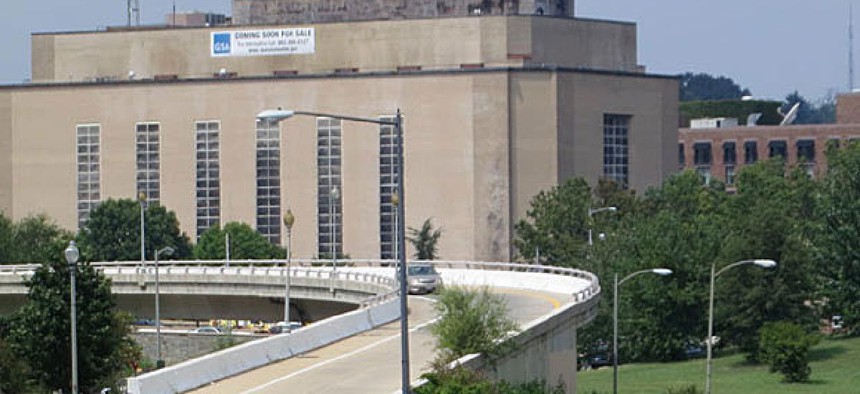
The agency’s online auction for selling the long-vacant federally owned Georgetown West Heating plant “received a lot of interest” from private-sector developers, according to GSA. Charles S. Clark/GovExec.com
GSA Seeing Some Success in Selling Real State, Efficient Leasing
Georgetown Heating Plant draws multiple private bids, hits $19 million.
The General Services Administration, whose leaders have been under fire from House Republicans for insufficient speed in selling unneeded federal properties, recently achieved progress on several fronts.
The agency’s online auction for selling the long-vacant federally owned Georgetown West Heating plant “received a lot of interest” from private-sector developers, according to GSA spokesman Dan Cruz. As of midday Monday, five bidders had made a play for the 60-plus-year-old facility located on prime Washington real estate, ending with a top bid of $19 million . Following several extensions of the deadline since Feb. 19, procedures call for the auction to remain open for 24 hours without a new bid.
Separately, the House Transportation and Infrastructure Committee recently approved 16 GSA leases at departments including Homeland Security, Health and Human Services, Defense and Interior. Officials project the moves will save $350 million.
“These savings are realized by reducing the space footprint of agencies, putting more people into less space, or lowering rental rates,” said Rep. Lou Barletta, R-Pa., chairman of the panel’s Economic Development, Public Buildings, and Emergency Management Subcommittee. “And because of the work of this committee, agencies are finally getting the message that we cannot operate as if it is business as usual.”
GSA and the committee have not always seen eye-to-eye on the extent to which the law requires GSA to win approval for leases from congressional oversight committees. Last July, when GSA signed a new lease for office space at the new World Trade Center in New York City, then-House Transportation Committee Chairman John Mica, R-Fla., complained the agency was ignoring the law. GSA argued that the sharing of such information is a courtesy.
Another major GSA project, the selection of a new location for FBI headquarters, continues to draw interest from private developers and public officials from the District of Columbia and suburban jurisdictions who would like to land the deal to aid with development near a Metro station.
Pros and cons of having the FBI pick a location downtown for what is envisioned as a headquarters larger and more modern than the boxy J. Edgar Hoover Building on Pennsylvania Avenue Northwest played out on Sunday in different sections of The Washington Post.
Arguments for staying within the district came from Garrett M. Graff, editor of Washingtonian and author of a book on the FBI. “We shouldn’t want to hide our chief law enforcement agency,” he wrote. “For four decades it has stood symbolically on Washington’s most important street. It’s not supposed to be covert; it is meant to be a publicly accountable law enforcement agency, front and center as a guardian of our democracy. “It should exist in the public eye, its building open to visitors, its officials close to the oversight of Congress, the Justice Department and the White House,” he said.
Arguing for a move the suburbs was Martin Austermuhle, who edits a D.C. blog. “Federal facilities don’t make particularly good neighbors; they don’t so much integrate into the community as impose upon it,” he wrote. “A new FBI building would be a highly secure facility, likely blocked off from surrounding neighborhoods by armed guards, bollards and walls.”







